Developing story
How MSF is responding to the war in Gaza
What to know about the humanitarian catastrophe in Gaza and how MSF teams are addressing the dire needs on the ground.
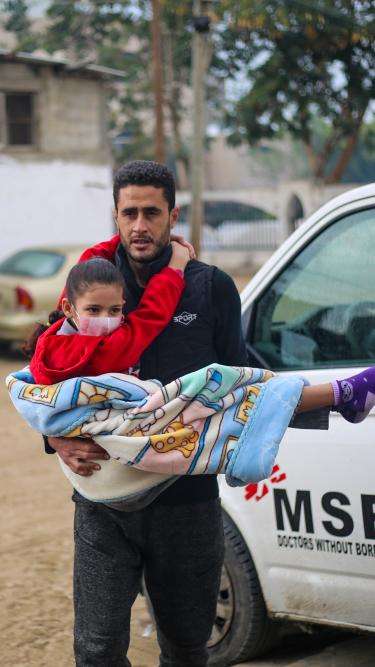
Developing story
What to know about the humanitarian catastrophe in Gaza and how MSF teams are addressing the dire needs on the ground.
After more than six months of war, Israeli forces’ unrelenting, indiscriminate strikes have reduced much of Gaza to rubble.
More than 33,000 Palestinians have been killed in Gaza and over 75,000 wounded, and thousands are estimated to be buried under the wreckage. Three-quarters of the population—1.7 million people—have been forcibly displaced by this war, the majority crammed into the south. Water and food are scarce. Essential supplies like fuel and electricity are scant. And while the threat of disease and starvation grows and the bombardment continues, lifesaving health care is increasingly inaccessible. Doctors Without Borders/Médecins Sans Frontières (MSF) teams in Gaza have witnessed firsthand how this war has turned a chronic humanitarian crisis into a catastrophe.
Photo above: Palestine 2023 © MSF
MSF staff have been working in Gaza’s hospitals and clinics throughout the current conflict. Our teams provide a range of essential medical services including:
Many of the hospitals MSF supports throughout Gaza have been hit or subjected to evacuation orders that put the lives of patients and staff at risk—so our teams are continually adapting to extremely volatile conditions on the ground. Today, MSF mainly operates in the south.
Our work has supported the following hospitals and clinics:
We are also working to secure the flow of essential supplies including food, water, fuel, medicine, and medical equipment. We were able to send over 75 tons of medical supplies—mainly surgical and dressing kits—through the Rafah border crossing with Egypt from October to January. Our teams in Egypt are ready to send more medical supplies into Gaza if allowed to do so safely. We are in contact with the Egyptian authorities and the relevant actors to provide health care for injured and sick Palestinians who are medically evacuated.
The medical needs in Gaza are immense. Many people need urgent assistance—including people trapped under rubble, pregnant women who are about to deliver, and the elderly—and are not able to access care when they need it most. The core needs MSF is seeing and seeking to address include:
Since October 7, increasing settler violence against Palestinians and movement restrictions have exacerbated the health impacts of life under occupation, particularly on mental health and access to care. MSF has responded by expanding efforts to reach communities unable to access care, bolstering local emergency response, and addressing the needs of Gazans who have been stranded in the West Bank after losing their work permits in Israel after October 7. Our activities include:
MSF does not currently run medical programs in Israel but offered its support to Israeli hospitals treating large numbers of casualties following the Hamas attacks on October 7. We focus on filling the greatest gaps in health care, and Israel has strong emergency and health systems.
MSF provides medical care to anyone who needs it, regardless of race, religion, or political affiliation. As an organization, we focus on filling the greatest gaps in health care.
To facilitate our humanitarian and medical work, we speak to all parties to the conflict to request safe, rapid, and unimpeded access to civilians who require medical care and to ensure the safety and security of our staff. Our independence and impartiality are essential to our work in all the places we operate across the globe.
We also believe that the principles of impartiality and neutrality are not synonymous with silence. When the world turns its back on crises, we are duty-bound to raise our voices and speak out on behalf of our patients. Our decision to do so is always guided by our mission to do no harm, preserve respect and dignity, and protect life and health.
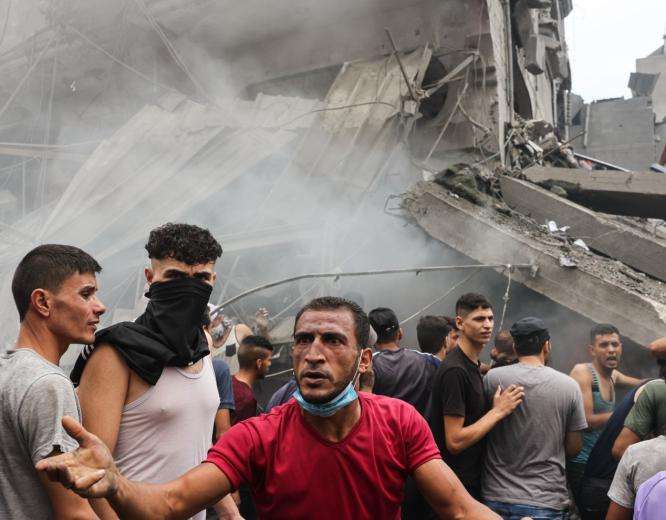
“We never imagined that this war would be different."
April 26 09:00 AM
The mental health impact of an unyielding war will leave health workers with scars for years to come.
Read More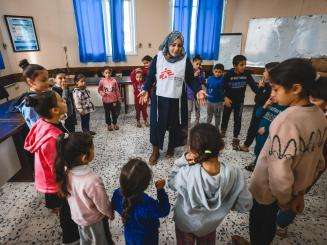
April 08 09:00 AM
MSF Secretary General Christopher Lockyear on political choices in Gaza.
Read More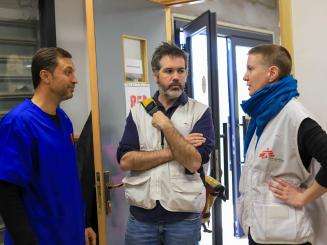
April 04 09:00 AM
Evidence points to deliberate and repeated attacks by Israeli forces on Nasser Hospital, once the largest hospital in southern Gaza.
Read More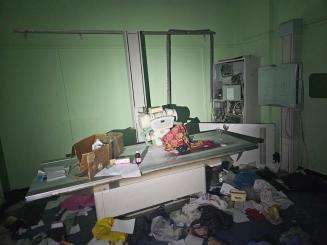
April 01 04:07 PM
Gaza’s largest hospital is again out of service, leaving patients without care as medical needs continue to rise.
Read More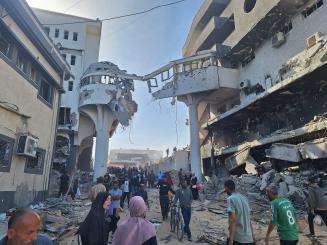
April 1: Israeli forces leave Al-Shifa Hospital in ruins after a 14-day military operation. According to the World Health Organization (WHO), 21 patients have died since the hospital came under siege, and about 107 other people remained trapped inside as of March 31, including four children and 28 people in critical condition. Gaza’s largest hospital is now out of service.
MSF is calling for the safe evacuation of the remaining patients so they can receive the care they need.
Mar. 31: An Israeli airstrike hits a yard in front of Al-Aqsa Hospital, where MSF provides trauma care, wound dressings, and other critical services.
Mar. 27: MSF staff in Rafah witness an airstrike in the vicinity of Al-Shaboura clinic. No casualties were reported among our patients or medical personnel, as the clinic was closed at the time of the attack.
Feb. 20: An Israeli tank fires on a house sheltering MSF staff members and their families in Al-Mawasi, Khan Younis, killing two people and injuring six more. Bullets were also fired at the clearly-marked MSF building, hitting its front gate, exterior, and the interior of its ground floor.
Feb. 14 - 15: Israeli forces order everyone inside Nasser Hospital to evacuate and then storm the hospital early in the morning. Everyone who leaves the hospital is screened by Israeli forces and one MSF staff member is detained.* MSF staff are forced to flee the hospital after the orthopedic department is shelled by Israeli forces, killing and wounding an undetermined number of people.
* Staff member was released on April 4
Feb. 13: Israeli forces order the evacuation of thousands of displaced people sheltering inside Nasser Hospital. Medical staff and patients are told they can remain in the building, with one caretaker per patient. Many people are afraid to leave the hospital because shots were fired at the building and at people trying to leave the compound.
Jan. 9: A strike on an MSF shelter in Khan Younis kills the five-year-old daughter of an MSF staff member.
Dec. 17: Israeli forces take control of Al-Awda Hospital after a 12-day siege. Men and boys over 16 years old are stripped and interrogated, with six MSF staff among them.
The same day, the maternity ward of Nasser Hospital is hit by the casing of Israeli “illumination rounds,” killing one patient and wounding others.
Dec. 12: An MSF surgeon is injured inside Al-Awda Hospital by a shot fired from the outside.
Dec. 5: MSF staff at Al-Awda Hospital report that the hospital is facing a total siege. In the following days, two medical staff (not MSF staff members) are shot and killed by snipers.
Dec. 1: Hours after the truce between ends, a blast damages Al-Awda Hospital.
Nov. 24: Israeli forces destroy a minibus attempting another evacuation of MSF staff and their relatives in the north.
Nov. 21: A strike on Al-Awda Hospital kills two MSF doctors, Dr. Mahmoud Abu Nujaila and Dr. Ahmad Al Sahar, and another doctor, Dr Ziad Al-Tatari.
Nov. 18: An MSF evacuation convoy is targeted by Israeli sniper fire, killing two people , including an MSF volunteer. Two days later, our colleagues sheltering in the MSF guesthouse witness a bulldozer and Israeli military vehicles destroy the MSF cars from the convoy. Israeli forces also damage the MSF clinic by pushing the vehicles against its perimeter wall, which fell down. Part of the clinic caught fire.
Nov. 15: Israeli ground troops storm Al-Shifa Hospital. All MSF staff had left the hospital about one week earlier.
Nov. 3: An ambulance is hit and destroyed outside Al-Shifa Hospital. Many people are killed.
Oct. 30: The Turkish-Palestinian Friendship Hospital is hit by a projectile, causing damage to the building. The hospital stops functioning when it runs out of fuel two days later.
Oct. 13: Israeli forces give Al-Awda Hospital two hours to evacuate. The hospital was not subsequently hit, but it was damaged by nearby bombing.
Oct. 11: Some of the ceilings inside Al-Awda Hospital in central Gaza are damaged after a nearby airstrike.
Oct. 10: An Israeli airstrike damages MSF’s clinic. No staff are injured.
Oct. 7: The blast from an airstrike that hit next to the MSF-supported Indonesian Hospital ignites oxygen canisters in the hospital, causing damage and killing a nurse (not an MSF staff member).
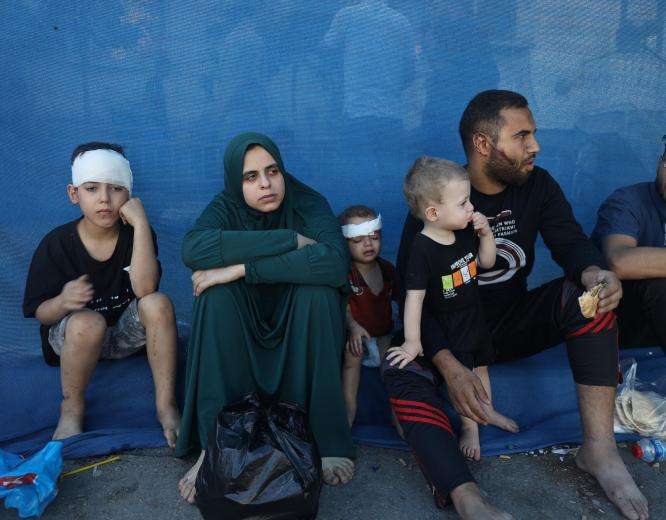
Members of MSF's team in Gaza share their experiences living and working under bombardment and siege.
Some humanitarian crises make the headlines—others don’t. Unrestricted support from our donors allows us to mobilize quickly and efficiently to provide lifesaving medical care to the people who need it most, whether those needs are in the spotlight or not. And your donation is 100 percent tax-deductible.